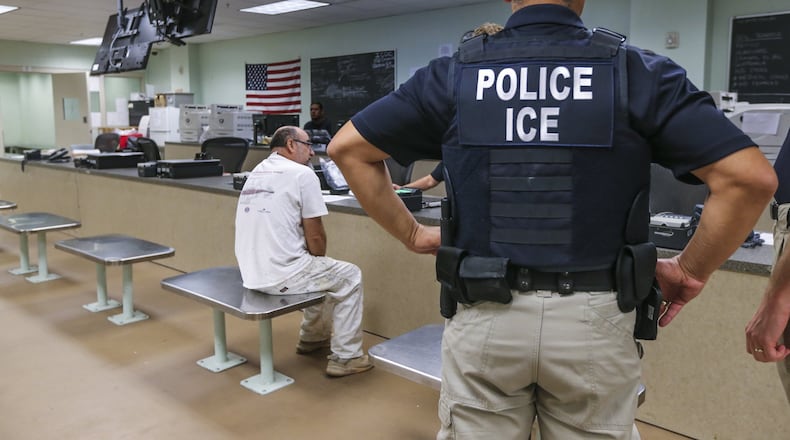The Clarke County Sheriff's Office in Athens has announced it is joining a growing number of Georgia law enforcement agencies that are limiting cooperation with federal immigration authorities in their jails.
The move by Clarke Sheriff Ira Edwards Jr. comes amid threats from the Trump administration to cut off federal funding to so-called “sanctuary cities” across the nation. Meanwhile, a state immigration enforcement panel is reviewing a complaint Lt. Gov. Casey Cagle — a Republican candidate for governor — has filed against a similar policy in Decatur.
In-Depth: Georgia cities limiting cooperation with ICE amid Trump’s crackdown
At issue is the Clarke sheriff’s recent decision to no longer honor U.S. Immigration and Customs Enforcement detainers, unless they are accompanied by a “judicial warrant or an order from a court.” Such detainers amount to requests to hold people suspected of being in the country illegally for up to 48 hours beyond the time they are scheduled to be released so ICE can pick them up and seek to deport them. Critics say detaining people for extra time under these circumstances can violate their Fourth Amendment protections against illegal search and seizure.
The Clarke Sheriff's Office released a statement Friday, saying it has received legal advice and "wishes to avoid the potential risk to the county of civil litigation relating to ICE detainers."
From July to December of 2017, the Clarke Sheriff’s Office received 22 ICE detainers. ICE picked up 15 of the people it targeted with those detainers. The remaining seven were released from the jail or were transferred to another jurisdiction. As of Friday, three Clarke jail detainees with pending criminal charges were the targets of ICE detainers. One of them has since bonded out of jail. The Sheriff’s Office identified the other two as Francisco Garcia-Linares, charged with a misdemeanor probation violation; and Carlos Berna Romero, charged with criminal damage to property. The Sheriff’s Office said it would not honor the detainers for them.
At the same time, the office said its decision does not amount to a “sanctuary policy” and will not designate Athens-Clarke County as a “sanctuary city.”
“Federal and state statutes cite the failure of communications and reporting of immigration status information to immigration authorities as a threshold for sanctuary designation,” the sheriff’s office said. “The sheriff intends to communicate and report immigration status as previously practiced.”
ICE spokesman Bryan Cox said it is safer for ICE to take custody of people “in the controlled environment of another law enforcement agency as opposed to ICE having to locate the individual at their residence, place of work, or another public area where weapons or other individuals may also be present.”
“When law enforcement agencies fail to honor detainers and release criminal aliens onto the street, it undermines ICE’s ability to protect public safety and carry out its mission,” he said in an email.
In September 2014, Fulton County commissioners passed a resolution urging Sheriff Ted Jackson to block ICE from using county facilities for “investigative interviews or other purposes.” Two months later, the Clayton County Sheriff’s Office announced it would no longer comply with ICE detainers. And a month after that, the DeKalb County Sheriff’s Office said it wouldn’t honor those detainers without a warrant or “sufficient probable cause.”
Then in May of last year, Clarkston’s City Council approved a policy saying city authorities shall not arrest or detain anyone based on ICE detainers. Fourth months after that, Decatur City Manager Peggy Merriss adopted a one-page policy prohibiting city police from arresting, detaining or transporting anyone based solely on an ICE detainer. Cagle has filed a complaint against Decatur’s policy with the Georgia Immigration Enforcement Review Board, alleging the city is violating a state law prohibiting “sanctuary policies.” The city denies that.
RELATED: Decatur, law firm suing Georgia’s Immigration Enforcement Review Board
Shawn Hanley, chairman of Georgia’s Immigration Enforcement Review Board, declined to comment about the Clarke sheriff’s decision.
About the Author
Keep Reading
The Latest
Featured



